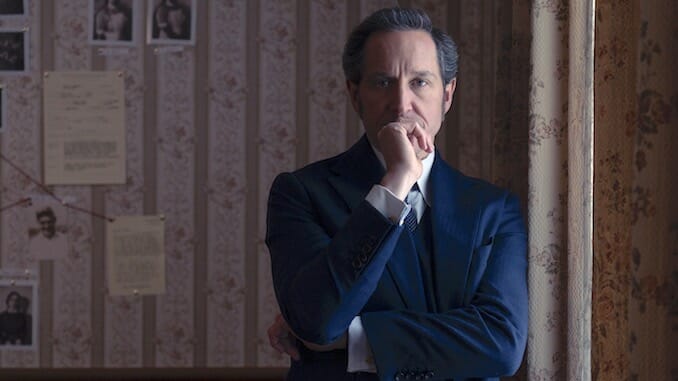Dalgliesh on Acorn TV Brings a Welcome Sense of Stillness to the Cozy Mystery Genre
Photo Courtesy of Acorn TV
Were I to make a single, sweeping criticism of contemporary television, it would be that it often doesn’t trust its audience. It doesn’t trust us to juggle more than a couple key plot points at any given time; it doesn’t trust us to clock individual characters’ motivations without having them explicitly spelled out for us; it doesn’t trust us to put even the simplest narrative together unless its pieces fit neatly into a conventional four-act structure.
It doesn’t, in short, trust us to watch.
Of course, as someone who can be as guilty as anyone of staring at my phone while “watching” TV, I not only understand this impulse, but appreciate it. My time on this earth is limited, after all, and it’s not like Twitter will scroll itself! As a critic, though—that is, as someone whose admiration for television, as an art form, has risen to the level of professional—I find this trend deeply distressing. Barring the continued existence of the MCU, there is arguably nothing else in the world that can do what TV does. In trusting its audience as little as it increasingly does to keep up with any complex, serialized visual narrative, television (as an art form!) impoverishes itself.
Not every show does this, of course—and I mean, sure, it goes without saying that there are worse categorical offenders (anything on American primetime) than others (the plurality of prestige dramas). But for every Reservation Dogs, Bosch, or The Expanse, you’ve got three times the number of CSIs, New Amsterdams and Lucifers. Honestly, it’s tiresome.
Which is all a labyrinthine way for me to say that I was desperately relieved to discover that Dalgliesh, the new period detective series from Acorn TV, trusts its audience. It trusts us to juggle a dozen plot points all at once; to clock even the most subtle (if not wholly concealed) character motivations; to piece genuinely complex narratives together, tired old four-act structure be damned. And, to do this without showing us even a glimpse inside Dalgliesh’s head until the literal final episode’s literal final scene.
It does, in short, trust us to watch.
But let me back up: For anyone unfamiliar with the character of Detective Chief Inspector Adam Dalgliesh, he’s the creation of critically beloved English novelist P.D. James, who spent a full 44 years of her career (from 1962 to 2008) walking in his shoes. Dalgliesh, in James’ rendering, is something of a paradox: An intensely private, quietly competent detective with London’s New Scotland Yard, he just so happens to also be a critically lauded poet who drives a Jaguar. Add to this the fact that he is, on top of all that, a still-grieving widower, and you’ve got what should amount to any detective-loving TV network’s prestige-adjacent dream.
-

-

-

-

-

-

-

-

-

-

-

-

-

-

-

-

-

-

-

-

-

-

-

-

-

-

-

-

-

-

-

-

-

-

-

-

-

-

-

-








































